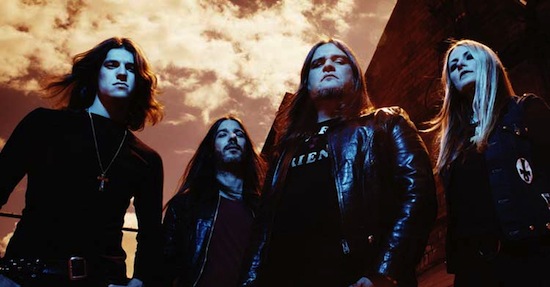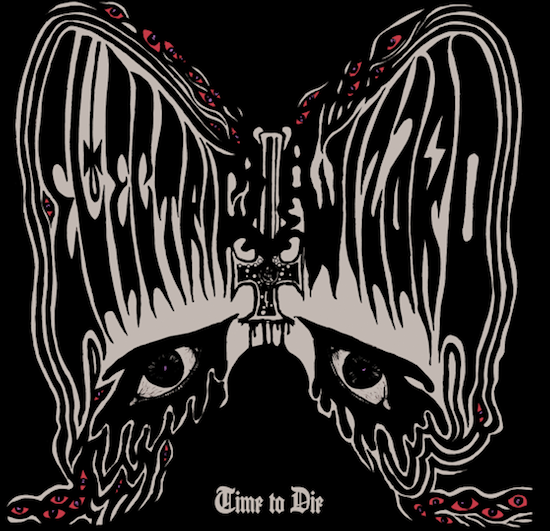Richard ‘Ricky’ Kasso, aka The Acid King, was seventeen years old when he shot to infamy for the murder of Gary Lauwers in Northport, Long Island in June 1984. Under the influence of powerful hallucinogenic drugs at the time, the murder took place in a reported satanic ritual in the woods − it was alleged he cut out the victim’s eyes. Two days after he was arrested (wearing an AC/DC shirt), Kasso hanged himself in his cell.
Time To Die, the eighth album by Electric Wizard, is an hour-long-plus invocation of Ricky Kasso, in dirt and blood-stained music, and samples of documentary news interspersed throughout. The latter are taken from a contemporary 20/20 special on Satanism called The Devil Worshippers. Kasso is the embodiment of the Electric Wizard ethos – ‘Legalize drugs and murder’ – and the terminal, stoned despair that led to his suicide is what the band has honed to vicious effect on this record.
For the avoidance of any doubt, Electric Wizard are one of the most important punk bands of all time. Black Sabbath’s ‘Into The Void’ – ground zero for the doom genre − posited escape from a dying world rife with chaos: "Through empires of eternal void/ Freedom from the final suicide." But in Electric Wizard’s music this spacecraft has lost power and is cast adrift in the infinity of the universe. This cosmic dread – ballasted with the febrile literary imagination of HP Lovecraft – is expressed in slow, dense and misanthropic music, delivering at least two classic albums: Come My Fanatics… (1996) and, in particular, the millennial masterpiece Dopethrone.
Until 2002’s Let Us Prey, the band was a three-piece, allowing space for jamming and a free-flowing non-conformity that cleaved to the classic rock philosophy of 1968-1973. They managed to triangulate the shittiness of being an outsider in 1990s Dorset, the gritty exploitation of VHS horror, and further back still, the terror of the civil war in England when the Witchfinder General stalked the Fens. Even so, this sonic (dis)order was a thin crust that could be easily broken to uncover a tumult of eternal, Cyclopean terror. They were a power trio in a category of one.
But the wheels came off: drummer Mark Greening and bassist Tim Bagshaw left to form Ramesses. Frontman Jus Oborn recruited Sourvein guitarist Liz Buckingham, who he also married, and with a two-pronged guitar attack and the explosive talents of Iron Monkey’s Justin Greaves on drums, put out the hugely underrated We Live in 2004 (just listen to the BBC session they recorded at this time for proof of this line-up’s potency).
But Greaves soon had enough and a big transition took place as Oborn began to work with Liam Watson at Toe Rag studios in Shoreditch. Operated by technicians in lab coats, the Wizard pushed the studio’s analogue equipment to its limits for Witchcult Today and Black Masses.
Both albums were well-received but lacked the band’s live power. There was a strong disconnect between the band’s performances, now astonishing, near-ceremonial affairs led by Oborn and Buckingham, and the recorded output which missed the ferocity and crazed invention of before. Not that they lacked atmosphere, quite the opposite – Black Masses oozed oppressive cruelty − but the songs seemed somehow enervated.

Repetition is no bad thing, and Electric Wizard trade on their self-made mythology (the Drugula character appearing across the last two albums for one) but the stately ascending/descending progressions of ‘The Chosen Few’ and ‘Witchcult Today’ felt like mirrors held up to each other; ‘Patterns Of Evil’ had a very similar groove to ‘Black Mass’: it just started to seem a little samey. There were exceptions: the sheer bounce and catchiness of ‘Dunwich’, the Helter Skelter of ‘Turn Off Your Mind’, and the mighty heft of ‘Torquemada 71’. Oborn’s cleaner vocal approach was a welcome development. But did any of these tracks hold a black candle to ‘Funeralopolis’? No. The main issue was that they lacked enough quality riffs, really memorable hooks, and the bongload of inspiration seemed to be running low.
This is not the case with Time To Die. The return of Mark Greening on drums coincides with a recapitulation of the more spontaneous, riff-driven approach, whilst retaining the retro aesthetic and songwriting prowess they have developed during Buckingham’s time in the band. The anger of old is back: stoked by the frustration of a turbulent year, not least a bitter legal dispute with erstwhile label Rise Above. The guitars growl and spit through the overdriven tube amplifiers, sparking where recently they have been more suppressed. Oborn takes full production credit on the album – I like to think he dropped some acid, ripped Watson’s lab coat off him and starting manically turning everything up to eleven.
Both ‘Incense For The Damned’ and ‘I Am Nothing’ begin with variations on a death march rhythm, the first breaking to a nodding-dog main riff, the latter a grim-faced chuggathon. Swirling eddies of electrical chaos are barely restrained. Time To Die re-animates Let Us Prey with Oborn’s distorted vocals and the restoration of the bass to prominence in the mix: it really churns the ground, like a gnarled gravedigger. ‘Incense For The Damned’ slows down in style to a half-time beating, and ‘I Am Nothing’ has a rocksteady 4/4 until it crashes into the Mountains Of Madness, echoing into space, echoing the way Dopethrone‘s ‘Weird Tales’ threw off its structure and yawned open to infinity.
There are shades of garage rock on this album, particularly the trance-like ‘Funeral Of Your Mind’, espousing the same on-and-on-and-on relentlessness of hard blues revivalists Endless Boogie. Even though ‘We Love The Dead’ slips back into the more atmosphere-laden approach of Black Masses, it still crackles. The surging ‘Sadiowitch’ and its reference to a ‘black drug’ that ‘took my soul away’ recalls ‘Burn Out’ from the Supercoven EP but takes itself home whereas the earlier song went on a bender.
It’s on penultimate track ‘Lucifer’s Slaves’ where this line-up − the old and the new − really pays off. All the lyrical tropes are in place − Satan, the Supercoven, the chosen few − a superb motor-ready main riff driving it all through. It flows into a creepy organ-led chord sequence, and then the band really goes IN. It bombs out, Oborn wailing over the maelstrom, and for those moments Electric Wizard take on and beat all-comers: they are Paddy Considine when he switches in the pub in Dead Man’s Shoes – ‘what the fuck you looking at?’ ‘YOU, YA CUNT!’
It manages to pick up the main riff again and Oborn overlays one of his trademark wah-heavy solos that takes them deep into the heart of Saturn. This nervelessness, that lets them turn on the chaos and turn off their minds − the conjuring of some undefinable terror is what made Electric Wizard so compelling in the first place.
‘Destroy Those Who Love God’ and ‘Saturn Dethroned’ are foreboding musical interludes that furnish the Ricky Kasso story; the media’s obsession with conflating drugs and rock music with Satanism and murder. Electric Wizard gleefully propound the stereotypes, again and again, as Greening’s fills follow the same pattern again and again. As it turns out, Mark Greening is once more out of the band. This new beginning is just another ending. What is stronger than life? Death.
The crime undiscovered by police for some days, Kasso took his friends to see his murder victim several times as the body rotted in the woods before he was arrested, just as we are taken back by Electric Wizard to the same carnage to look upon the horror they’ve created. They want to be misunderstood. They want to be hated.
Time To Die is not perfect, but it’s a nastier, hungrier album that stands with their best work. They remind us of this at the very end with the same sample from the 20/20 episode they also used at the very start of Dopethrone − a warning from Dale Griffis, police chief of Tiffin, Ohio: "When you get into one of these trips there’s only a couple of ways out: death or mental institutions." Except this time they add the final part: "The third is: you can’t get out." We are caught in Electric Wizard’s bad trip. The truth is we don’t want to get out.


